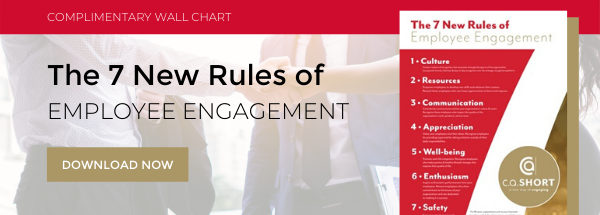Proper employee education and training are essential to the continuity of business. This is not just a general notion either, but actually something shown in research. Surveys on the main reasons for high turnover rates in business indicate clearly that “little room for growth” and a lack of incentives “except at the management level” are major factors. These responses speak to the fact that if employees don’t feel properly supported in their growth, they’re likely to move on — which, in turn, makes it harder for businesses to endure.
This is a problem across all sorts of different companies. But it also gives business leaders a clear incentive to provide more support for employees. That support can come in a number of different forms, but some of the best ways to make employees feel as if their futures are being valued is to foster education and training, both within and beyond the workplace.
It’s with this in mind that we want to cover some of the top trends in employee education and training we’re going to see in 2021.
Implementing Learning Analytics
The practice of learning analytics is one that’s being considered more and more with regard to ordinary student education. It’s viewed as a means of enhancing e-learning in light of the pandemic, and it may well be the way of the future in organizing educational practices. But its fundamental function — tracking student performance to compile useful insights — can and will be applied to employee education as well.
Through processes similar to learning analytics, companies will begin to measure the effectiveness of training programs and the performance of employees in training. This in turn will drive more effective training programs, and by extension more employee practice.
Supporting External Education
The past decade or so has brought about significant growth in online and remote educational opportunities that working professionals can use to gain fresh knowledge and enhance qualifications.
Many, for instance, are pursuing education in growing fields with widespread demand, like digital media and communications. Others are seeking an online master’s in business data analytics with the specific goal of enhancing their value, or entering an abundant and rapidly growing job market sprawling across industries.
These are only a few examples, but the bottom line is that online degree programs are thriving, and drawing a lot of attention from people who are employed but want to expand their résumés.
This trend only seems to be intensifying, and it is in employers’ best interest to support it, rather than fight it.
For this reason, and particularly with lots of companies operating remotely in the first place, we expect to see more support for external education. Whether that support is merely positive encouragement or extends to financial help will depend on the company.
Leveraging Social Media & Forums
This is a less formal possibility. But it’s important to remember that a lot of employee education and training comes down to conversation and questions as well. And particularly with more businesses operating remotely, this is something companies will need to do a better job of promoting and encouraging moving forward.
For this reason, we do expect to see more businesses leveraging social media and in-house forums and messaging boards to cultivate suitable environments for questions, answers, and education.
In different ways, these tools and forums can be turned into places where employees are encouraged to talk with peers, ask questions of superiors, and advance in their understanding of operations.
Conducting More Personal Evaluations
Another consequence of businesses moving to remote or part-time conditions is that employee evaluations might get even less personal.
It’s all too common already for companies to do the bare minimum when it comes to evaluations, and while this can still lead to valuable feedback, it often leaves the employees themselves feeling somewhat ignored.
To combat this problem, we believe some forward-looking businesses will look to change things in the opposite direction, and come up with ways to make employee evaluations more personal. This essentially means one-on-one interviews that may be thorough, but which will also be designed to be true conversations rather than just checklists or performance reviews.
Implementing this kind of change is a wonderful way for a business leader to make employees feel seen and heard, and it ultimately results in more useful, constructive feedback as well. Employees should leave their reviews feeling like they know how to do better at their jobs.
Empowering Employee CMOs
The idea of employees becoming their own CMOs (or Chief Marketing Officers) is one that’s gained steam in recent years. It can mean a few different things, but the general idea is that employees are taking charge of tweaking and enhancing their own résumés in order to appeal to modern recruiting tools.
Employers today use a variety of tools to comb through data, identify keywords, and basically spot candidates based on accomplishments and qualifications. Savvy employees thus recognize that by continuing to add qualifications, skills, positions, degrees, and anything similar, they’re directly increasing the likelihood of interesting job advancement or offers. And because this is already going on, we expect more businesses will begin to support and empower the process through training.
In other words, businesses will increasingly help employees to advance and gain more qualifications. If they stay in-house, it’s directly beneficial to the company; if they leave for better positions, they will ultimately reflect well on your company.
There will surely be more trends than these throughout 2021, but these are some of the key ways in which we see training and education of employees changing in the year ahead.










SHARE